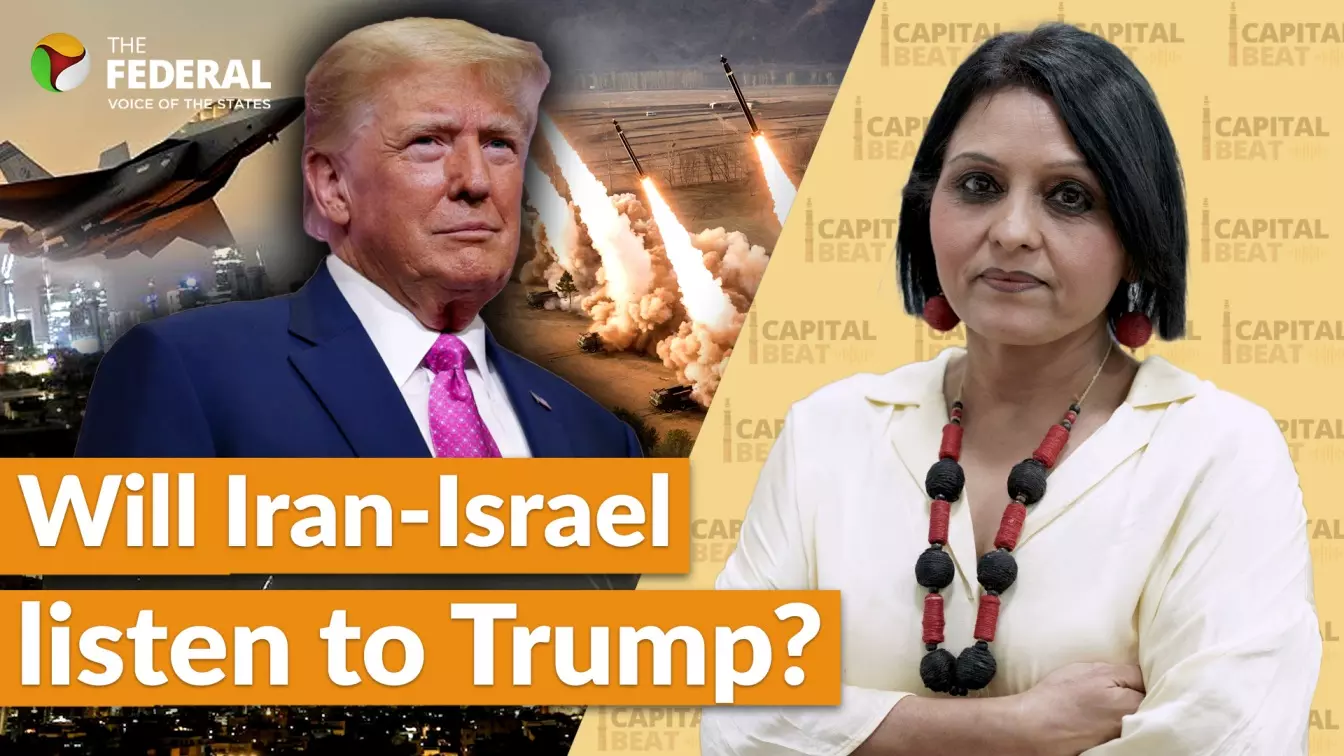
Donald Trump announced a 'total ceasefire' but Tehran denied that there is a formal agreement.
Iran-Israel ceasefire: US-Israel's purpose served, conflict paused
International affairs expert Prof Pasha and The Federal’s Consulting Editor Dakshina Murthy analyse the ceasefire, who gains the most from it, and what lies ahead

In this episode of Capital Beat, international affairs expert Prof Aftab Kamal Pasha and The Federal's Consulting Editor KS Dakshina Murthy join the discussion on the dramatic and contested ceasefire between Israel and Iran announced by US President Donald Trump. The panellists analyse what triggered the ceasefire, who gains the most from it, and what lies ahead for the Middle East.
'Iran's surprising counterstrike'
Opening the discussion, Prof Pasha pointed out that Israel launched pre-emptive strikes against Iran, targetting key nuclear sites like Natanz and Fordow, along with missile production centres and military installations. According to him, Iran’s surprising counterstrike capabilities, especially using hypersonic and ballistic missiles, stunned even the US and Israeli defence establishments.
Also Read: Iran-Israel ceasefire: Don't drop those bombs, Trump warns Israel
“Iran struck targets ranging from Mossad headquarters to Israel's defence ministry and gas platforms in the Mediterranean,” he noted, emphasising the breach of Israel’s much-lauded multi-layered air defence system.
Purpose served, war paused
Dakshina Murthy argued that Trump’s announcement of a ceasefire was timed strategically.
“The core objective of the US and Israel - to damage Iran’s nuclear facilities - was achieved,” he said.
Murthy noted that such interventions were not new for Israel, recalling previous strikes in Iraq (1981) and Syria (2007) to halt nuclear programmes.
Also Read: Indian markets rebound sharply after US-brokered ceasefire eases tensions
While Iran responded with power, Murthy suggested that the damage to its nuclear infrastructure - though unverified - was likely significant.
“With their objective met, Israel and the US saw no reason to prolong the war,” he explained.
'Iran will rebuild'
On Iran’s future, Prof Pasha was firm, “Iran will rebuild. Their atomic energy chief has already stated that reconstruction of nuclear sites is underway.”
He reiterated Iran’s right under the Non-Proliferation Treaty (NPT) to pursue peaceful nuclear technology.
Also Read: Israel-Iran conflict LIVE | Trump says both Iran, Israel violated ceasefire
Addressing rumours of succession within Iran, Pasha said such speculation was routine.
“The Guardian Council has systems in place for leadership continuity,” he clarified, denying any real instability.
'Israel tactical winner'
Dakshina Murthy believed that from a tactical point of view, Israel emerged as the immediate winner.
“They achieved their goal and got out. Iran, however, will continue its program - it may be delayed but not derailed,” he said.
Asked about Donald Trump’s role and intentions, Prof Pasha offered sharp insights. He argued that Trump’s ceasefire push was driven by domestic politics.
Also Read: Iran may have moved 400 kg uranium, enough for 10 nukes, before US strikes
“There are rising calls for his impeachment, and polls show over 56 per cent of Americans disapprove of the strikes,” he said.
Pasha called the narrative of Israeli "victory" superficial.
“Iran’s underground nuclear infrastructure is largely intact,” he said.
Trump’s Nobel ambition?
There was speculation about Trump angling for a Nobel Peace Prize through his repeated ceasefire efforts - first in India-Pakistan, now Israel-Iran. Prof Pasha suggested Trump’s strategy might involve brief escalations followed by dramatic ceasefire claims.
However, growing unrest within his own Republican Party - fuelled by claims that he bypassed Congress’s war powers - may hinder that ambition.
“Trump promised no new wars. This action contradicts that,” said Pasha.
Regional consequences
The conversation turned to regional consequences, especially the Strait of Hormuz.
“Iran has the capacity to close it - a move that would paralyse global oil routes,” warned Pasha.
He cited GPS-jamming incidents and tanker collisions as evidence of Iran’s capabilities.
Also Read: Indian airlines suspend flights to Middle East amid rising tensions
Adding to this, Murthy explained the wider geopolitical rifts.
“The Middle East remains fractured. The US and Israel have divided the region - UAE and Saudi Arabia lean toward them, leaving Iran isolated,” he said.
No end to instability
Murthy closed by highlighting that the ceasefire was not peace.
“The Middle East hasn’t stabilised since the US invasion of Iraq in 2003. Fault lines - sectarian, political, and ideological - will keep the region volatile," he said.
Both experts agreed that unless the Palestinian issue is resolved, turmoil will persist.
“The disconnect between Arab rulers and their people is widening. It’s a recipe for future uprisings,” warned Prof Pasha.
(The content above has been generated using a fine-tuned AI model. To ensure accuracy, quality, and editorial integrity, we employ a Human-In-The-Loop (HITL) process. While AI assists in creating the initial draft, our experienced editorial team carefully reviews, edits, and refines the content before publication. At The Federal, we combine the efficiency of AI with the expertise of human editors to deliver reliable and insightful journalism.)

